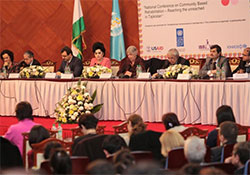Reaching the unreached: first national conference on community-based rehabilitation in Tajikistan

Bahrom Jalilov
Community-based rehabilitation (CBR) was initiated in 1978 as a strategy to improve access to rehabilitation services for people with disabilities by making optimum use of local resources. After 30 years of collaboration between WHO, other United Nations organizations, nongovernmental organizations and organizations of people with disabilities, CBR has evolved into a multisectoral strategy to address the broader needs of people with disabilities, ensuring their participation and inclusion in society and enhancing their quality of life.
The first national conference on CBR in Tajikistan entitled “Reaching the unreached” took place on 2 December 2014 in the National Library of Dushanbe. The conference was hosted by the Ministry of Health and Social Protection of the Population together with WHO and in coordination with other relevant ministries, civil society organizations and organizations of people with disabilities. The conference was organized with the active support and participation of United States Agency for International Development (USAID), United Nations Development Programme (UNDP) and United Nations Children’s Fund (UNICEF).
With over 350 representatives from different sectors across the country, the conference was one of the largest dedicated to disability issues ever conducted in Tajikistan, and thereby also illustrated the keen interest in CBR in Tajikistan.
Policy-makers and other stakeholders in the fields of health, social protection, education, labour, finance, justice, transport and infrastructure seized this opportunity to:
- highlight advances in CBR practices
- launch CBR guidelines in the Tajik language
- identify potentially suitable CBR models for Tajikistan
- foster collaboration and knowledge exchange across sectors
- generate potential solutions for disability issues in Tajikistan.
Empowerment of people with disabilities requires a multi-sectoral strategy that will allow them to access and benefit from education, employment, health and social services. The conference reinforced the message that through the combined efforts of people with disabilities, their families and communities, and relevant government and nongovernment health, education, labour, social and other services, an equitable environment can be generated.
“We all need to be involved and committed to ensure access to quality services for people with disabilities. This is a precondition for achieving equal opportunities and living with dignity. By investing in rehabilitation in Tajikistan today, we are laying a foundation for an inclusive society for tomorrow,” said Dr Bobokhojieva, First Deputy Minister of Health of Tajikistan
“Including people with disabilities and providing them with access to health and rehabilitation services is vital. We must work towards making our world a world for all,” highlighted Dr Pavel Ursu, WHO Representative in Tajikistan.
Outcomes
CBR is a major focus of WHO and the Ministry within the framework of the disability rehabilitation programme. This national conference will play a key role in the successful implementation of the disability and rehabilitation programme in the country and contribute to improving the quality of life of people with disabilities in Tajikistan.
The conference ended with resolutions that included:
- guiding principles to implement CBR programmes, which will strengthen the equal access of persons with disabilities to community resources at all levels of society, and
- inputs for strengthening public policies and systems, service providers, users and international cooperations.



